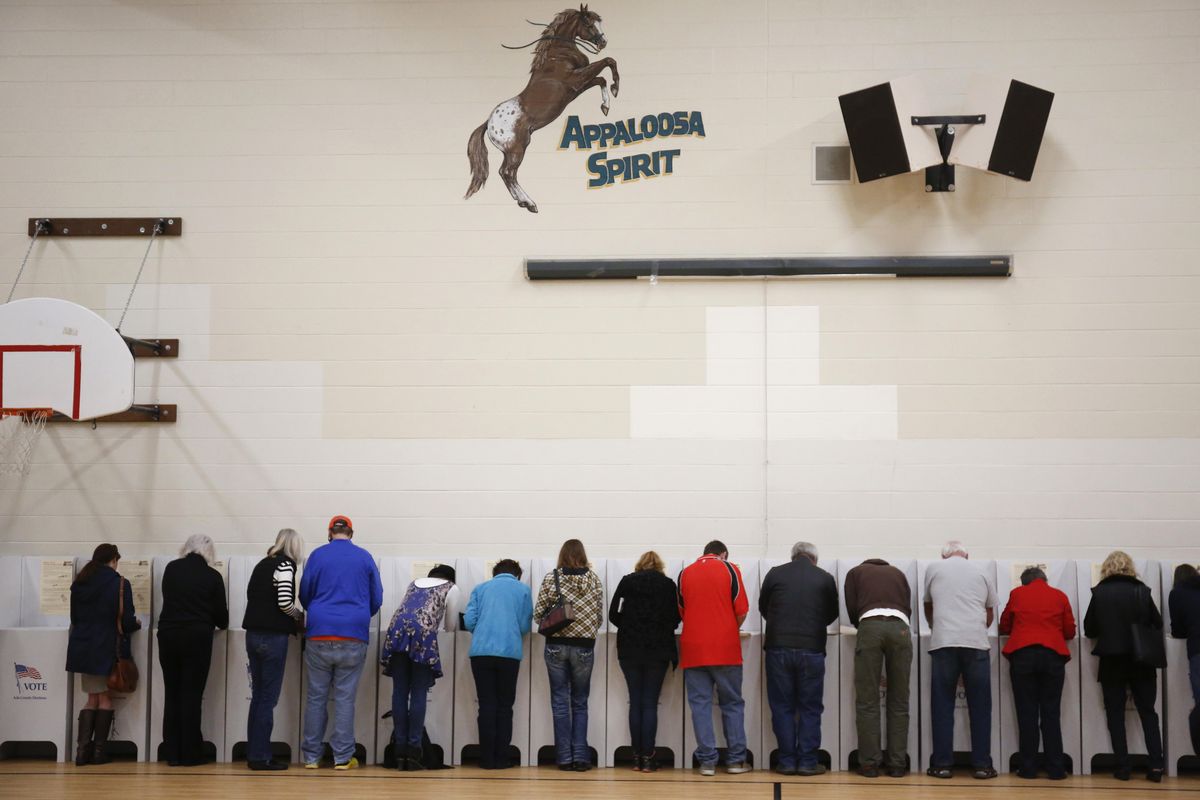Idaho chafes at Trump request for voter information

BOISE - Idaho is refusing to fully comply with the Trump Administration’s efforts to collect extensive voter information from all 50 states.
Tim Hurst, Idaho chief deputy secretary of state, said Wednesday that the office has so far received 238 emails “and a gazillion phone calls saying, ‘Don’t give our information out.’”
The move puts Idaho among 44 states, including Washington, that have declined the data gathering efforts of the White House’s election integrity commission. Idaho officials aren’t enthusiastic about the request – in part because they say Idaho has always safeguarded the integrity of its elections.
Idaho Secretary of State Lawerence Denney, a Republican, said in a statement this week that he’ll be guided by the Idaho Public Records Act, which makes some portions of the requested information public record while exempting others, but he’s continuing to review the request, as is the Idaho Attorney General’s office.
“Typically, sending information to the feds raises a lot of concern, and personal information going to anybody raises a lot of concern,” Hurst said.
Idaho’s voter roll – its list of registered voters – is a public document that is commonly requested each election cycle by political parties, candidates, and others, including The Spokesman-Review, which requested a copy of the voter roll several years ago as part of a reporting project. The fee is $20.
But the Trump commission wants more than what’s in the standard document – which includes name, mailing address, county, gender, age (not birthdate), telephone number if provided, party affiliation if declared, and in which year’s elections the registered voter cast a ballot, dating back to 2006.
The commission also wants states to turn over voters’ birthdates; the last four digits of their Social Security numbers; more extensive voting history information; and information about felony convictions, voter registration in other states, active, inactive or canceled status, and other data points that aren’t part of Idaho’s system.
Idaho Democratic legislative leaders have been vociferously opposing any cooperation with the federal request. Denney has agreed to meet with them before responding to the Trump commission on July 14.
“Idaho’s voters never imagined the federal government would demand their private information to be compiled in a central database in Washington, D.C., with no explanation as to how it would be used or what it would be used for,” House and Senate minority leaders said in a letter Monday to Denney. “The federal demand has little to do with voter fraud. It is a blatant attack on the sovereign right of the state of Idaho to protect its own elections and the privacy of its citizens.”
Denney is headed Friday to a national meeting of secretaries of state, at which the request is expected to be a big topic.
President Trump, both during his campaign and after the election, claimed without evidence that millions had voted illegally in the 2016 presidential election. He named Kansas Secretary of State Kris Kobach vice chairman of his “Presidential Advisory Commission on Election Integrity,” created by executive order in May. The commission’s chair is Vice President Mike Pence.
Kobach told CNN’s Anderson Cooper last week, “The commission is not to prove or disprove what the president speculated about in January. The purpose of the commission is to find facts and put them on the table.”
Kobach was elected Kansas secretary of state in 2010 on an anti-voter fraud platform, raising alarms about everyone from non-citizens to dead people voting. Little evidence of any of that was found, however.
In Idaho, Hurst said, “I think our registration is pretty clean.”
Monthly reports on deaths from the Idaho Bureau of Vital Statistics are compared to the state’s voter roll, and dead voters’ registrations are purged. Also, local county election officials scan local obituaries for local residents who die out of state, and purge their registrations as well. Monthly reports from state probation and parole officials track those whose felony convictions make them ineligible to vote, and when they’ve been released and regained their right to register to vote.
Idaho’s system also automatically flags anyone who tries to vote more than once in an Idaho election, such as in two counties; a couple of people are prosecuted for that every four years, and typically face fines and community service.
Idaho also purges its voter rolls of those who don’t cast ballots every four years, while most states do so every eight years; the state is exempt from granting another four years of inactive status because it offers same-day registration at the polls to those who aren’t registered or whose registration isn’t up to date.
“It helps a lot when you only have 800,000 voters,” Hurst said. “Our small numbers make it easier for us to make sure they’re right.”
Since 2012, Idaho has been one of roughly two dozen states that is part of an interstate “Crosscheck” program that compares voter registration rolls across states every two years to guard against duplications..
“So there’s a lot of checking that’s being done anyway,” Hurst said. “I think this president’s commission is more of a witch hunt than anything else.”
Washington Secretary of State Kim Wyman, also a Republican, said Monday it was “ludicrous on its face” to suggest there was widespread voter fraud across thousands of electoral districts in the United States. She announced that she’s referring Trump’s commission to a publicly available link of voter data, but would share no private information with the panel.